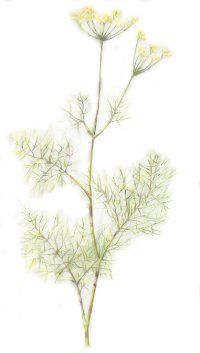It is recommended for numerous complaints related to excessive gas in the stomach and intestines, including indigestion, cramps, and bloating, as well as for colic in infants. Other Apiaceae family members, such as dill and caraway, also are considered carminatives.
As an antispasmodic, fennel acts on the smooth muscle of the respiratory passages as well as the stomach and intestines; this is the reason that fennel preparations are used to relieve bronchial spasms. Since it relaxes bronchial passages, allowing them to open wider, it is sometimes included in asthma, bronchitis, and cough formulas.
Fennel long has been used to promote milk production in nursing mothers. And because of its antispasmodic activity, breastfed infants whose mothers drink fennel tea are less likely to suffer from colic than other babies.
